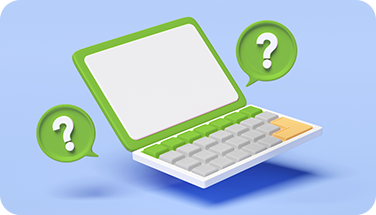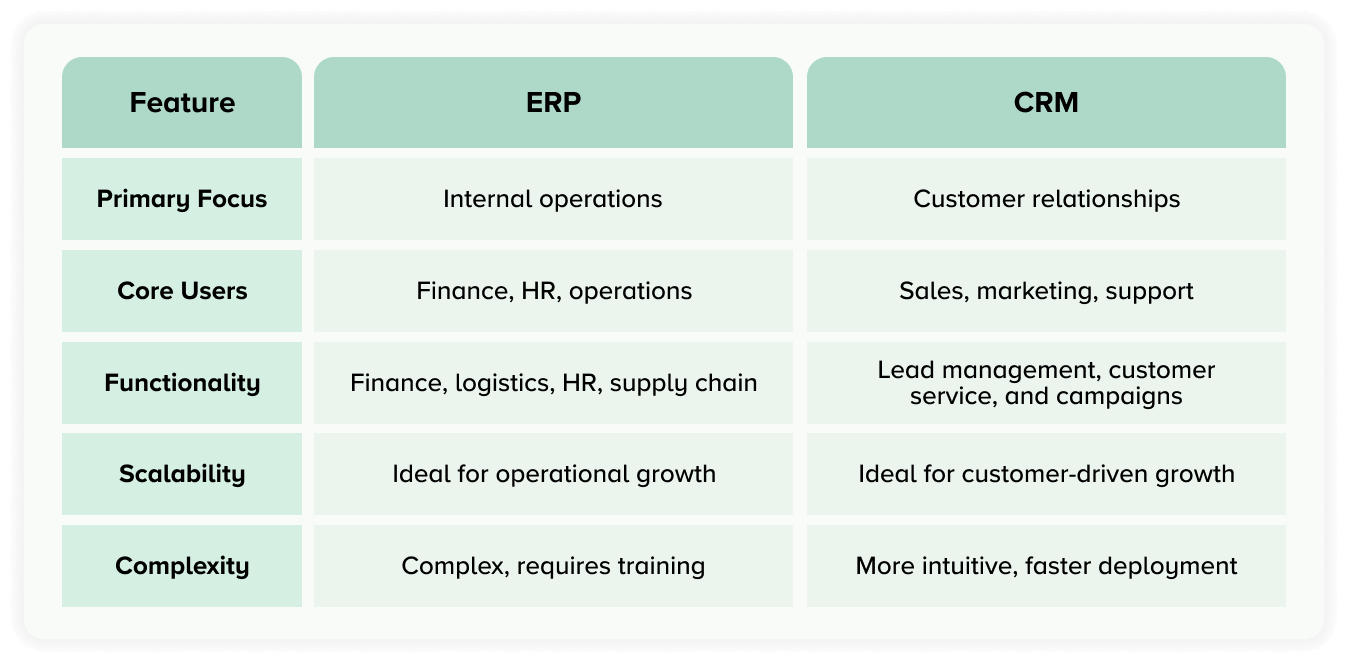What is the difference between ERP and CRM?
ERP - Enterprise Resource Planning and CRM - Customer Relationship Management serve different purposes in a business. ERP focuses on integrating and managing various internal processes (back-end operations) such as HR, finance, and procurement. CRM is specifically designed for managing customer relationships (front-end interactions with customers).

What is an ERP system?
An Enterprise Resource Planning (ERP) system is a centralized platform that unifies core business functions, such as finance, human resources (HR), procurement, manufacturing, and supply chain management, into a single, streamlined infrastructure.
By consolidating data and automating workflows, ERP systems eliminate silos, enhance decision-making, and improve cross-functional efficiency.
Key ERP capabilities:
- Financial management – Real-time visibility into budgets, forecasts, and financial performance
- Supply chain optimization – End-to-end inventory, procurement, and logistics oversight
- Human Capital Management (HCM) – Centralized employee data, payroll, and benefits administration
- Project and resource planning – Integrated task tracking, time management, and cost control
- Automation and analytics – Reduced manual tasks and actionable business intelligence
ERP advantages:
- Streamlined cross-departmental collaboration
- Greater efficiency through automation
- Real-time data for agile decision-making
- Scalable architecture for growing enterprises
ERP considerations:
- High upfront investment and longer implementation timelines
- Learning curve for users unfamiliar with enterprise systems
- May exceed the needs of smaller, less complex operations

See Unit4 ERP Project Management in action
From planning and execution, to billing and completion – watch short on-demand demos to match your needs.
What is a CRM system?
A Customer Relationship Management (CRM) system, in contrast, focuses externally, enhancing how organizations attract, engage, and retain customers. CRM systems centralize contact data and sales interactions while automating marketing and support workflows, making them indispensable to customer-facing teams.
Key CRM capabilities:
- Customer data centralization – Unified view of leads, customers, and interactions
- Sales pipeline management – Opportunity tracking, forecasting, and deal acceleration
- Marketing automation – Campaign execution, segmentation, and lead nurturing
- Customer service tools – Ticketing systems, live support, and self-service portals
- Insight-driven analytics – Behavioral data to inform strategy and personalization
CRM advantages:
- Stronger customer relationships through personalized engagement
- Improved retention and upsell opportunities
- Sales and marketing alignment through shared data
- Faster onboarding and easier user adoption
CRM Considerations:
- Limited functionality outside of customer engagement
- Requires consistent data hygiene to maximize value
- May offer minimal benefit to organizations with limited sales cycles or support demands
ERP vs CRM: Key differences at a glance

When comparing ERP vs CRM, it’s less about which is “better” and more about which aligns with your business objectives. In many cases, a combined ERP and CRM strategy delivers the highest ROI, connecting back-end operational efficiency with front-end customer excellence.
Choosing the right system for scalable business growth
Technology continues to redefine how businesses scale, compete, and connect, with ERP and CRM systems serving as foundational pillars in this digital transformation.
While both platforms drive operational performance, they serve distinct functions. For growing businesses, understanding the difference between ERP systems and CRM is essential for selecting the right solution or determining if a combined approach is the strategic move.
Click to read ERP product brochure Gated
ERP, CRM, or both? Strategic guidance for growing businesses
Choose ERP if:
- Operational inefficiencies are impacting productivity
- Financial reporting lacks accuracy or timeliness
- Manual processes create bottlenecks across departments
Choose CRM if:
- Your customer experience lacks personalization or consistency
- Sales pipeline visibility is limited
- Retention and engagement are core growth metrics
Choose both if:
- You need to connect internal operations with customer-facing functions
- Your business is scaling rapidly and requires enterprise-wide visibility
- You aim to deliver seamless end-to-end value, from supply chain to customer success
Why Unit4?
Unit4 delivers ERP with integration available for CRM solutions designed for people-centric organizations navigating change and growth. Our ERP system empowers back-office teams with automation and insight, while integration with CRM solutions drives deeper customer engagement and revenue enablement.
With a Cloud-first architecture, modular flexibility, and AI-powered intelligence, Unit4 equips your business with the agility to adapt and thrive within a unified digital ecosystem. For more information, you can watch a demo or talk to our sales team today.





